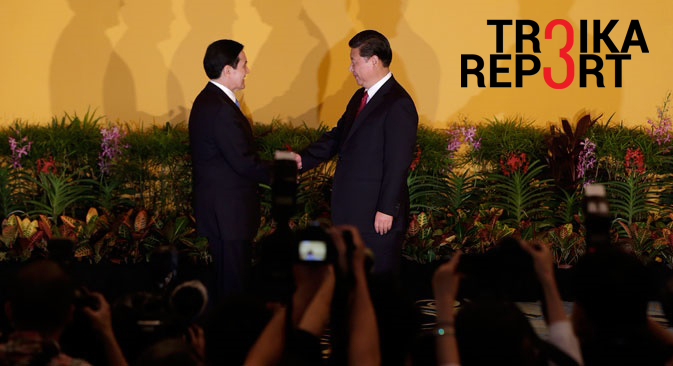
Chinese President Xi Jinping (R) and Taiwanese President Ma Ying-Jeou shake hands at the Shangri-La Hotel in Singapore, Nov. 7, 2015
EPAThe historic handshake between Chinese President Xi Jinping and Taiwanese President Ma Ying-jeou on Nov. 7, which lasted for more than a minute, was a deliberate manifestation that the two parts of this ancient civilization can positively engage with each other after all irrespective of ideological differences and past grievances.
Russia and other Asia-Pacific nations are viewing the dramatic reconciliation over the Taiwanese Straits with mixed sentiments, ranging from approval to apprehension, disdain and alarm.
One of the greatest schisms in modern history looks ready to be patched up, although not in a hurry, but in the tempo typical of China’s gradual advancement in the last two decades.
Mainland China, as termed by the islanders, and Taiwan have been locking horns since the civil war ended when the Nationalists, under Chiang Kai-shek, lost the battle for supremacy to the Communists under Mao Zedong, and were forced to flee to Taiwan. Ever since then the relations between the two culturally Chinese entities have been marred by animosity and suspicion.
The leaders of the two Cold War foes met for the first time in 66 years on neutral ground in the city-state of Singapore. The words of Chairman Xi – “We are one family” and “No force can pull us apart” – were interpreted as a signal that the long-cherished goal of unification with Taiwan has not been shelved.
The response of President Ma that “Both sides should respect each other's values and way of life” was read as an emphasis of the differences separating the mainlanders and the islanders, who for too long have been drifting under different sails and flags.
But is this truly a major turnaround in the turbulent history of relations between the Chinese mainland and the island so often labeled by Beijing as a “rebellious province” treacherously reluctant to join the motherland? Alexander Lomanov, Head research fellow of the Institute of Far-Eastern Economic Studies at the Russian Academy of Sciences, provided this answer to Troika Report:
“It is highly significant that both Taiwan’s and China’s leaders are able to sit together and talk about people-to-people cooperation, increasing trade and investment. The problem looked like a blind alley some 50-60 years ago when the only way of assimilation was by the use of weapons, by a Chinese invasion of the island. Now it is different, and both sides are talking about economic cooperation, and, in particular, about thousands of Taiwanese students getting support to study in China’s universities. In the 21st century China, having become an economic giant, is in a better position to deal with Taiwan.”
- In 1997 the British colony of Hong Kong became once again part of China, seen as a precedent for “piecing together” the lands inhabited by the Chinese. Recently, Chairman Xi has proclaimed sort of a Grand Chinese Dream concept, as an alternative to the American Dream, with the probable aim of luring the Chinese diaspora. Now we have witnessed the landmark meeting of Taiwanese and Chinese leaders. Are these all parts of a long-term trend?
“First of all, about the Hong Kong model. The model ‘one country, two systems’ was implemented in Hong Kong and Macao. In case of Taiwan, this is not applicable. The reason is simple. The fate of Hong Kong was not negotiated with the people living there but with the ‘colonial masters’ residing in London. Similarly, the fate of Macao was decided though talks with its former colonial masters in Lisbon.
“Taiwan is not a colony. Despite certain deficiencies, it is a democracy. Any negotiations on the integration of Taiwan would take much more time than in the case of Hong Kong and Macao, and would require more flexibility and delicacy.”
- To what extent could this historical handshake affect Russia’s national interests?
“For Russia, I think this is quite a positive development.”
“For Russia, China is not a liability but a very valuable asset. Back in the mid-90s, many critics were against Russia’s friendship with China due to the threat of being drawn into a conflict with the United States over Taiwan. This probability is diminishing year-on-year. It has been significantly reduced after this meeting between Ma and Xi.”
- Is that all? Is that the only gain Moscow can count on?
“The integration process embracing China and Taiwan would expand Russia’s economic outreach in the region. It would be beneficial for cooperation with both mainland China and Taiwan.”
Anyway, integration will not start overnight. Yet the Chinese proverb fits in well: A long march begins with the first step, and Mr. Ma and Mr. Xi have taken this step in what can be seen as an as-yet unrevealed attempt to strengthen the future of Greater China. In a region where symbols can well serve as substance, this is no small deal.
The opinion of the writer may not necessarily reflect the position of RBTH or its staff.
All rights reserved by Rossiyskaya Gazeta.
Subscribe
to our newsletter!
Get the week's best stories straight to your inbox